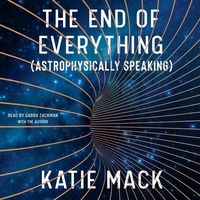Take a photo of a barcode or cover
adventurous
emotional
funny
hopeful
informative
mysterious
reflective
sad
medium-paced
Initially, I felt like this book maybe wasn’t for me. I’ve already done a lot of my own research into astrophysics, and at the beginning, Mack was covering a lot of information I already knew, so I was honestly kind of bored. However, as she went on, she went more in depth than I expected her to, but not so in depth that it could be difficult to understand; Mack handles the balance between interest and the amount of information well. Since I was a bit bored in the beginning (and honestly, the jokes were getting a bit too cheesy, but I liked a decent amount of them), but also since I warmed up to the thorough research and breadth of information she put into the book: 4 stars. A good book.
challenging
informative
mysterious
fast-paced
challenging
funny
informative
medium-paced
It took me two tries to finish this book but it was worth it to give it another try when I couldn’t concentrate on all the profound details during my first try. The book was full of scientific information about physics and the cosmos and I really liked how funny the author presented all this complicated stuff. It took me a while to work my way through it because I wanted to understand what I was reading (it worked better than anticipated).
I definitely liked the many allegories Katie Mack used to make the steps to the different cosmological ends of our universe more approachable. They helped a lot and made me laugh at times. It’s also a great feat to be able to make physics that interesting. I’m a scientist myself and my physics professors held the most boring lectures one can imagine. Guess lectures by this author would be way more fun and much more intriguing.
The book turned very philosophical in the end which was a comprehensible conclusion to make but I found the execution of that part too short and shallow. Tbh, I would have preferred for it not to be there at all and to let the astrophysical concepts speak for themselves.
All in all it was an enjoyable and interesting book.
I definitely liked the many allegories Katie Mack used to make the steps to the different cosmological ends of our universe more approachable. They helped a lot and made me laugh at times. It’s also a great feat to be able to make physics that interesting. I’m a scientist myself and my physics professors held the most boring lectures one can imagine. Guess lectures by this author would be way more fun and much more intriguing.
The book turned very philosophical in the end which was a comprehensible conclusion to make but I found the execution of that part too short and shallow. Tbh, I would have preferred for it not to be there at all and to let the astrophysical concepts speak for themselves.
All in all it was an enjoyable and interesting book.
challenging
informative
inspiring
mysterious
medium-paced
Mack is a great science communicator, what I read of this was very engaging and colloquial. But these are complex topics that are basically sliding right off my brain.
informative
informative
fast-paced
Not the type of book that I normally read but I quite enjoyed this one. Like someone just sat you down and explained their hyper-fixation to you. I’m not mad about it.
challenging
informative
Many non-fiction books seem to think they need a hook to get audiences to buy them (and maybe they do), but the hook is often slightly untrue, making the whole work feel like a marketing ploy. The hook here is THE END OF THE UNIVERSE. The author tells us in the first couple of sentences that life on Earth will almost definitely end when the sun burns us all up in about 5 billion years. But the book is about the end of the universe, which will probably come later.
The problem is that she's constantly talking about the end of the universe as if it will affect any of us, as if it is a very important problem to solve, rather than a theoretical question that will have no impact on human life whatsoever. She then goes on to present 5 possible ends of the universe, some of which she admits are extremely, extremely unlikely, even as shes hypes them up as completely terrifying. The hook, therefore, is not particularly compelling (why should I care about the end of the universe if it comes after the end of all human life?) and also rather deceitful (most of these theories are simply ideas, with little or no real evidence to back them-- why would I be scared of a completely unbacked idea?).
That being said, I liked a lot of the background information provided about the Big Bang and the current lines of inquiry being pursued to learn more about physics and the universe. I do feel like I have a much firmer grasp on what astrophysics is and what it's trying to achieve, and the book is short so I didn't have to work particularly hard to gain that knowledge.
The problem is that she's constantly talking about the end of the universe as if it will affect any of us, as if it is a very important problem to solve, rather than a theoretical question that will have no impact on human life whatsoever. She then goes on to present 5 possible ends of the universe, some of which she admits are extremely, extremely unlikely, even as shes hypes them up as completely terrifying. The hook, therefore, is not particularly compelling (why should I care about the end of the universe if it comes after the end of all human life?) and also rather deceitful (most of these theories are simply ideas, with little or no real evidence to back them-- why would I be scared of a completely unbacked idea?).
That being said, I liked a lot of the background information provided about the Big Bang and the current lines of inquiry being pursued to learn more about physics and the universe. I do feel like I have a much firmer grasp on what astrophysics is and what it's trying to achieve, and the book is short so I didn't have to work particularly hard to gain that knowledge.
Above all, read the footnotes in this witty, educational, and entertaining book of science.
challenging
informative
slow-paced










